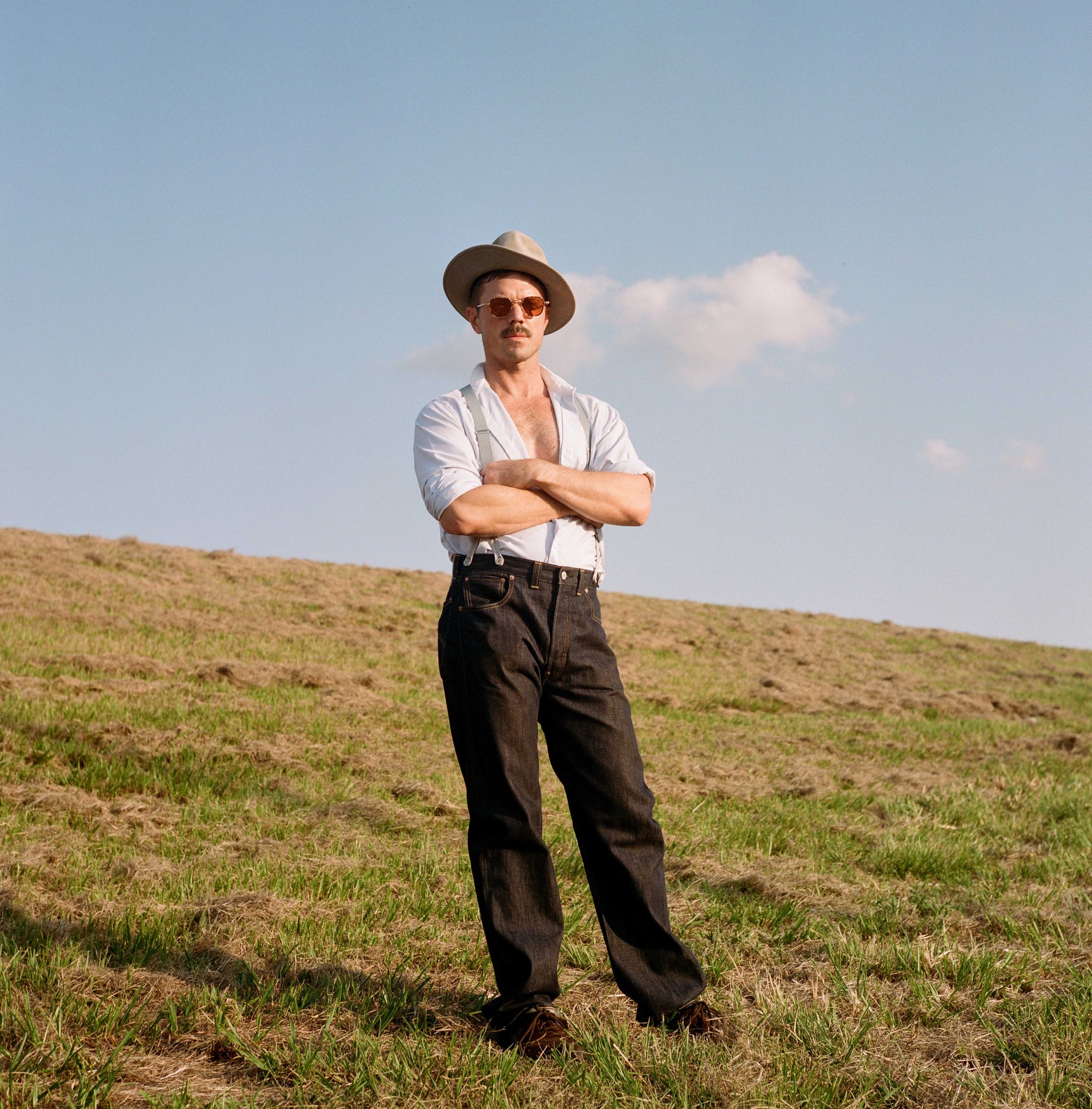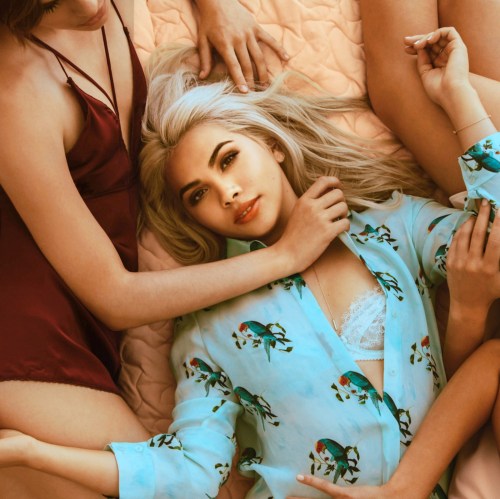A sunny evening on the streets of Fitzrovia. Jake Shears — once the frontman of glam-pop group Scissor Sisters — is pacing up and down the middle of the road on his phone, frantically dodging tourists and Boris bikes as he goes. It’s been a while since he was last here, but the baking weather the New York expat is accustomed to has followed him on the flight over. He wanders round a corner, causing his publicist to lose him momentarily. “I don’t like standing still!” Jake claims, when i-D pin him down to have a drink and a chat a few moments later. No kidding.
London was once the place Jake Shears called home. Back when Scissor Sisters shot to fame as a queer-friendly, NYC quintet early in the millennium, it was the United Kingdom that professed their loved for the band first. Their eponymous debut grabbed the number one spot back in 2004 — spawning several radio hits like Laura and Filthy/Gorgeous — and went nine-times platinum in the process.
Four albums and over a decade later, the group decided to disband, and Jake hasn’t been on British soil as much as he would’ve liked to since. But he’s back and has come bearing gifts — the promise of his first record as a solo artist. Usually, musicians take this as an opportunity to reinvent themselves, but Shears — confident, but barely cocky — seems to know exactly what he’s good at.
Still, he’s sat in front of us, ruminating over how close he came to having a slight identity crisis at the point of going solo. “We always have to check in and find ourselves again,” he admits, slouched into a seat in the back room of his hotel. “There was a wave of self-acceptance I had to do before I got there with this record. I had to listen to my heart and realise that I wanted to make fucking New Orleans Honky Tonk!”
And so that’s what he did. After living in New York, London and LA, Jake retreated to the southern state of Louisiana to road test a new way of making music. The time felt right. “I had split with my partner of 11 years, which was obviously very sad,” he says of his relationship with Gaga: Five Foot Two director Chris Moukarbel. But he envisioned the possibility of turning a negative into a positive. Now, he had no one to answer to: “I packed my suitcase, got a ticket and went by myself.”
Life seemed slower and more simple there, especially in the summer when it got “a little too quiet”. He’d drive around the outskirts of the city, recording voice notes on his phone that would turn into album tracks; and hang out with dogs from the shelter across the street from his apartment. Absconding from Hollywood life for a while seemed like the best thing for him — especially after the end of a long-term relationship. So was this upbeat, shining, Honky Tonk sound — particularly on the track, Sad Song Backwards — masking a body of work that nursed him through a break up?
“I hope not!” he laughs. “Sure, there’s heartbreak on it, but I went out of my way to make a party album. To make something that felt like good times.” Instead, he calls it a ‘post-break up record’. “And it’s not even about that, but just about finding my voice. After 40 years on this earth, I can see a pattern. I’ll always be losing myself and it’ll take me a while to find me again. It’s a cycle.”
One of the album’s most raucous, party-spun moments comes in the form of Big Bushy Moustache; the video for which features a Josh Homme cameo and premieres exclusively here on i-D. “That video was shot guerilla style!” he grins, bearing a Hollywood smile and recounting the experience of shooting it under crazy time constraints . They shot three clips in one week, with an all-leather get-up, five random men, and an indeterminable number of stick-on, joke shop ‘staches. “Geez, half of the people we just grabbed off the street! And it was sweltering, so we just got everybody daiquiris to keep them happy.”
On paper, the song sounds like a parody of hypermasculine stereotypes and how queer people have slotted them into their own, Tom of Finland-style aesthetic. Lyrically though, it’s inspired by Jake’s ostentatious facial hair at the time, and how it caused a bunch of straight men he ran into to strike up conversations about it. “It was like having a muscle car!” Jake grins, cheekily. “It’s an odd feeling… how they wanted to be me because I have way more fun than they do!”
In that sense it feels, like many songs on this record, like being liberated from your past and having the choice to do whatever the fuck you want to, for better or worse. “When you have a big life change, I think you automatically have some sort of crazy appearance change too,” he says. Jake’s transformation was twofold: he worked out to the point of looking swollen, then grew a huge moustache — something he’d always wanted to do. “I look back and realise I wasn’t in a good way,” he says, sounding almost half-joking, “but I was unrecognisable. I felt like a nobody.”
It’s been a long time since Shears has been a nobody. After all, almost two decades have passed since Scissor Sisters became a pop anomaly, skyrocketing from New York gay bars into the ears of the general public. That’s a trajectory so few artists — especially those creating untraditional pop like Jake — can pull off.
A question I ask about modern queer pop spurs into a lengthy chat about streaming algorithms and what they expose us to, as well as the palatability of queerness in music. “I think contemporary production fucking sucks,” he says, talking about the bulk of Billboard-friendly pop made today. “It takes me two seconds to listen to something and I’m exhausted.” There’s this feeling in the back of his mind that this slightly bonkers album — recorded live with a bunch of instruments most pop stars today would sniff at — feels like a huge risk in today’s landscape.
“I learned so much from this record. I just want to be able to afford to make another one,” he sighs. “This ain’t FruityLoops — this shit costs real fucking money, and that’s part of the heartbreak. The struggle of it is that I want to be able to do this and have it sound how I want it to sound. Is that possible? Was this my one chance that I had? I don’t know.”
Even so, Jake’s still effusively positive and confident about the here and now, and the album he’s put everything into. “I’m of the belief that to hear this record is to love this record,” he smiles. “I’m sure there will be cunty writers and bad reviews, but on my little, cocky cloud, I’m asking myself ‘How could you ever not like it?’. The challenge now is just getting it to people’s ears.”
He pauses for so long that we jolt towards the next question, but he interjects. “Look, it’s a gross time we live in right now. Our days are dark,” he remarks pointedly, leaning forward in his seat to make sure we’re listening. “All that’s important to me — and I get this from my mom — is to make people happy.” It seems like Jake Shears’s record, a rare glimpse of unfettered, unconventional joy in the midst of a messed-up America, might just be the brilliant tonic we’re all looking for.

